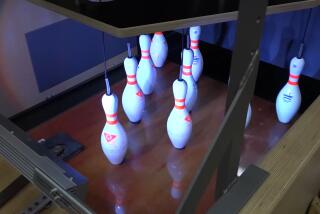A WICKET Game : It Takes as Much Coordination as Pool, as Incisive a Mind as Chess. But Players Have a Ball.
- Share via
The men are happily discussing deadness.
It is a perfect Sunday afternoon in Roxbury Park in Beverly Hills, and neither David Collins, 35, nor Rhys Thomas, 33, appears to have a care in the world, except for this deadness business.
“I’m dead on yellow only,” Thomas explains to a visitor, not really illuminating much. Collins, on the other hand, is three-ball dead on blue.
What does it all mean? Have these young men found some secret to inner peace that even Shirley MacLaine might envy?
Yes and no. Thomas, producer of Fox Entertainment News, and Collins, an advertising executive, are members of the Beverly Hills Croquet Club. Clad in traditional whites, they are doing what they do virtually every Sunday for fun, trying to slip croquet balls the size of grapefruits through wickets tighter than a Bob Mackie dress.
Deadness is fairly dreadful, even in croquet, where it is a transitory state.
In modern six-wicket croquet, which is what these men usually play, you cannot re-hit a ball until you pass through the next hoop, clearing the ball of deadness. As Darryl F. Zanuck, one of old Hollywood’s croquet fanatics, once put it, “When you’re three-ball dead, you’re just a useless bum.”
Today is the first day of the second Beverly Hills Open, hosted by the Westside club. Players from around the country will compete through Sunday for a top prize of $1,000 (entry fee is $100). Play will start at 8 a.m. on the croquet lawn in Roxbury Park and continue throughout the day, with the semifinal and final matches to be played Sunday, beginning at 10 a.m. The public is welcome to watch.
Collins, who lives in Burbank, and Thomas, of Sherman Oaks, are part of a small but growing contingent of aficionados who regard croquet not as a back-yard game, but as a world-class sport. Croquet, its champions maintain, requires as much eye-hand coordination as pool or polo and as incisive a mind as chess. Some practitioners say it takes at least two years to master the strategy of successful play. Thomas says you never stop learning strategy.
Most of us remember croquet as one of the lesser pleasures of childhood, something to keep you from killing your brothers and sisters before the burgers were done.
But the new breed of competitors play as if croquet were major league--as if money, beautiful consorts and other valuable prizes were at stake as they try to disable each other.
Not that anyone actually says this. Collins, Thomas and others talk about the exhilaration of planning and executing a winning strategy and how fit walking briskly around the croquet lawn makes them feel. But nothing else adequately explains why players take it so seriously. As Michelle Thomas, Rhys’ bride of a few weeks, observes: “If he misses a triple peel, he dwells on it for the next three days.”
More popular than tennis in 19th Century England, croquet was an Olympic event in 1904--an American, Charles Jacob of Springfield, Conn., took the gold. More recently, adult croquet has been gaining in popularity in America since 1977, when Jack Osborn founded the United States Croquet Assn. in Palm Beach, Fla.
The association regularized the rules of a six-wicket version of the game and has given its imprimatur to almost 300 clubs throughout the United States, including the one in Beverly Hills. In the past, the city has been home to such legendary players as Sam Goldwyn, who had two courses at home, the upper and the less prestigious lower; Harpo Marx, who spent a small fortune on air-conditioning for his equipment, and Louis Jourdan, who could run an entire course before his cigarette burned out.
Today’s Beverly Hills Croquet Club, which was founded in 1983 by actor Cesare Danova, has about 30 active members. They include octogenarian Philip Reed, who, as a mallet-wielding actor, clacked away in some of the great Hollywood battles of the past.
Nationally, about 500 people, including dozens of women, take part in tournament play. A half-dozen country clubs and resorts have resident pros.
A few years ago, Osborn and his associates were predicting that croquet would take off as a professional sport, with big-money matches underwritten by champagne companies and other upper-crust sponsors. That hasn’t happened. Although many people who play croquet are rich, no one is getting that way playing. Thomas won $500 last year.
Much as tennis once was, croquet is played mostly by people who are wealthy--and white. When the USCA surveyed its 3,000 active members in 1987, the average household income was $150,000. A quarter of the households reported assets of $1 million or more. Of the 35% who owned luxury cars, the vehicle of choice was--surprise, surprise--the Mercedes-Benz.
But that is changing, the new breed insists. Modern croquet is open to everyone. As it becomes less a country club game and more a true sport, it is being democratized by the greatest of levelers--talent.
“This is a colorless, sexless game,” Thomas says. “I’d love to get a guy like Magic Johnson out here.
“We’ll get him a longer mallet.”
A WICKET GAME
Croquet probably originated in France and made its way to the United States around 1870. Originally played by society groups, it was one of the first games in which women and men competed on an even basis. American lawn croquet, English croquet and roque are the leading modern versions of the game.
Source: Encyclopedia Americana
More to Read
Go beyond the scoreboard
Get the latest on L.A.'s teams in the daily Sports Report newsletter.
You may occasionally receive promotional content from the Los Angeles Times.










